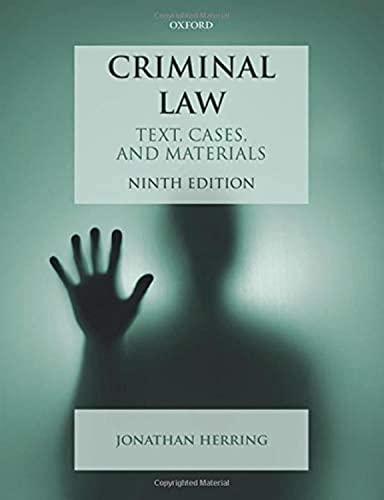Question
The United Nations (the UN) was established after the horrors of WWII including the attempted genocide of the Jewish populations in Germany and German occupied
The United Nations (the UN) was established after the horrors of WWII including the attempted genocide of the Jewish populations in Germany and German occupied territories. Genocide and mass killings have remained a problem since WWII with recent examples in Rwanda, the former Yugoslavia and, allegedly, in the Ukraine and Gaza today. In 2005 the UN General Assembly (the UN GA) adopted the Responsibility to Protect - 'an international norm that seeks to ensure that the international community never again fails to halt the mass atrocity crimes of genocide, war crimes, ethnic cleansing and crimes against humanity' (Global Centre for the Responsibility to Protect, What is R2P (https://www.globalr2p.org/what-is-r2p)).
Assume that Australia is concerned about an allegation of genocide occurring somewhere in the world. The Australian government is contemplating:
1. Raising the matter in the UNGA;
2. Putting together a 'coalition of the willing' to intervene in a way that is consistent with the responsibility to protect;
3. Seeking orders in the International Court of Justice (the ICJ);
4. Referring alleged offenders to the International Criminal Court (the ICC); and/or
5. Taking action against the alleged offenders under Australian domestic law.
Critically discuss the role of the International Court of Justiceand their ability to take meaningful action to prevent or punish the crime of genocide.
In answering this question, you will need to consider, as a minimum:
- Convention on the Prevention and Punishment of the Crime of Genocide (1951).
Depending on the institutions you choose to discuss you should also consider, as a minimum:
- The Statute of Rome creating the International Criminal Court.
- The UN Charter in particular the role of the GA and the Security Council.
- The Responsibility to Protect.
- Arguments before the International Court of Justice in South Africa v Israel and Ukraine v Russian Federation.
- Australian domestic law (including Polyukhovich v Commonwealth ("War Crimes Act case") [1991] HCA 32, Nulyarimma v Thompson (1999) FCR 153, the Genocide Convention Act 1949 (Cth) and the Criminal Code Act 1995 (Cth)).
Step by Step Solution
There are 3 Steps involved in it
Step: 1

Get Instant Access to Expert-Tailored Solutions
See step-by-step solutions with expert insights and AI powered tools for academic success
Step: 2

Step: 3

Ace Your Homework with AI
Get the answers you need in no time with our AI-driven, step-by-step assistance
Get Started


